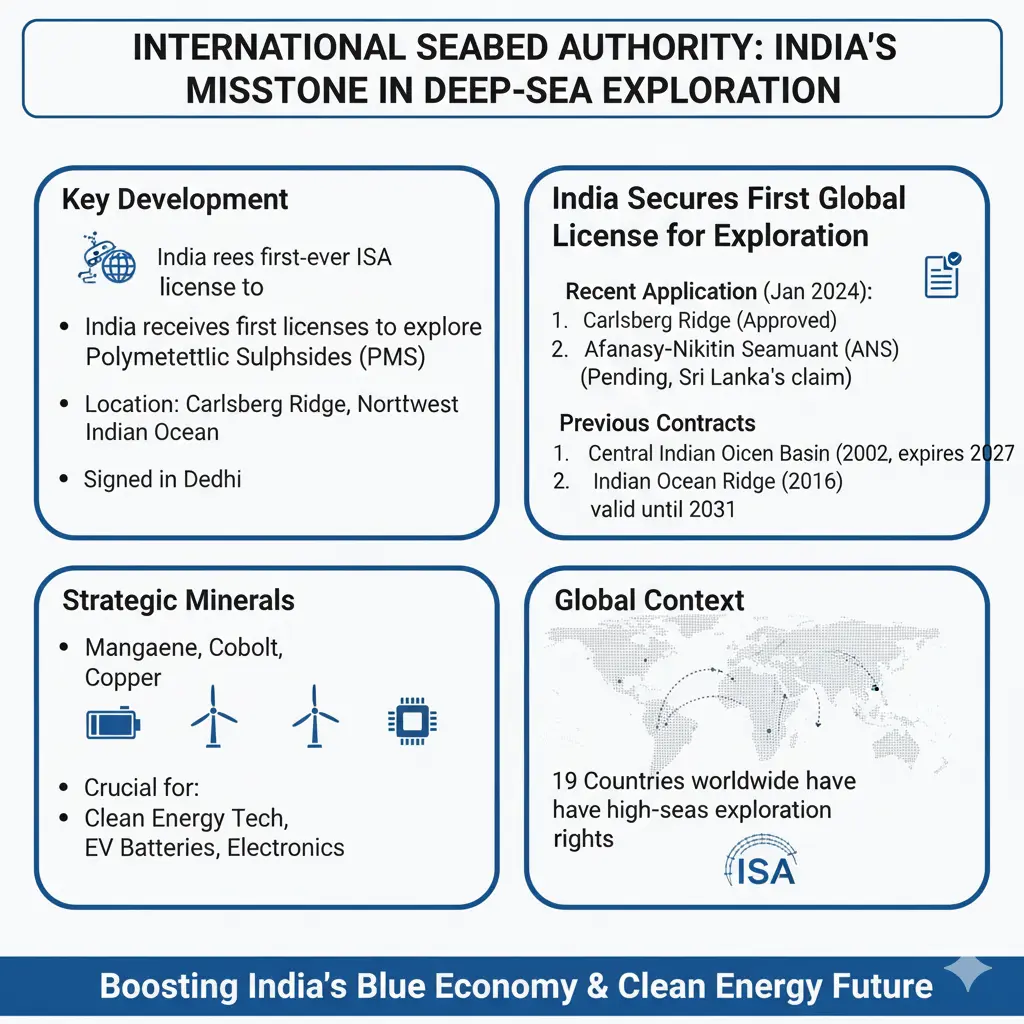September 16, 2025
International Seabed Authority: 5 Strategic Wins for India’s Blue Economy
International Seabed Authority (ISA)
India has received its first-ever global license from the International Seabed Authority (ISA) to explore polymetallic sulphides (PMS) in the Carlsberg Ridge located in the northwest Indian Ocean. This is a major milestone for India’s deep-sea exploration and Blue Economy goals.
The agreement was signed in New Delhi and will enable India to search for valuable minerals such as manganese, cobalt, nickel, and copper. These minerals are crucial for clean energy technologies, electric vehicle batteries, and electronic manufacturing.
India had applied in January 2024 for exploration rights in two regions:
- Carlsberg Ridge, which has now been approved.
- Afanasy-Nikitin Seamount (ANS), which is still pending approval because Sri Lanka has also staked a claim to this area.
Previously, India received two exploration contracts from the ISA:
- In 2002, for the Central Indian Ocean Basin, which will expire in March 2027 after two extensions.
- In 2016, for polymetallic sulphides in another part of the Indian Ocean Ridge, valid until September 2031.
Currently, 19 countries worldwide have exploration rights for such high-seas resources.

Carlsberg Ridge and its Importance:
- The Carlsberg Ridge is a massive, 3,00,000 square kilometre mid-ocean ridge located between the Indian and Arabian tectonic plates. It stretches from near Rodrigues Island in the southwest Indian Ocean to the Owen Fracture Zone near the Arabian Sea.
- Polymetallic sulphides are found deep on the ocean floor and are rich in metals like manganese, cobalt, nickel, and copper. These metals are critical for manufacturing renewable energy infrastructure, electric vehicles, and electronics.
- Since this region lies beyond the jurisdiction of any single country, it is classified as part of the high seas, and exploration rights must be granted by the ISA under the rules of the United Nations Convention on the Law of the Sea (UNCLOS).
About United Nations Convention on the Law of the Sea (UNCLOS):
UNCLOS is often referred to as the “Constitution of the Oceans”. It was adopted in 1982 and came into force in 1994. Its headquarters is in Montego Bay, Jamaica.
The convention sets out the legal framework for the use of oceans and their resources. It defines how far a country’s sovereignty extends into the sea and governs navigation, environmental protection, and resource management.
Under UNCLOS:
- A country can claim up to 200 nautical miles from its baseline as an Exclusive Economic Zone (EEZ), giving it exclusive rights to explore and exploit marine resources.
- The continental shelf can be extended up to 350 nautical miles, and in certain regions like the Bay of Bengal, it can be extended up to 500 nautical miles.
- Areas beyond national jurisdiction, known as the high seas, are considered the common heritage of mankind. No single country can claim ownership, and activities there are regulated collectively through the ISA.
India, being a signatory to UNCLOS, is entitled to apply for exploration rights in these international waters.
About International Seabed Authority (ISA):
- The International Seabed Authority was established in 1994 under the framework of UNCLOS. It is headquartered in Kingston, Jamaica, and has 168 member states plus the European Union.
- The ISA is responsible for regulating the exploration and exploitation of mineral resources in areas beyond national jurisdiction. This includes managing resources like polymetallic nodules, polymetallic sulphides, and cobalt-rich crusts.
- The guiding principle of the ISA is that these resources are the “common heritage of mankind”, meaning they must be managed for the collective benefit of all countries.
- India is recognized as a pioneer investor country because it was among the first to receive exploration contracts, starting in 2002. Decisions in ISA are made through three main bodies – the Assembly, Council, and Secretariat.
Significance for India:
This development is strategically important for India in several ways:
Critical Mineral Security – The exploration rights will help India secure vital minerals like cobalt, nickel, manganese, and copper, which are essential for the clean energy transition and reducing reliance on imports, especially from China.
Boost to the Blue Economy – This aligns with India’s Deep Ocean Mission and long-term strategy for sustainable use of marine resources.
Geostrategic Leverage – Control over deep-sea exploration enhances India’s influence in the Indian Ocean Region, countering the growing presence of China and other major powers.
Scientific Advancement – The mission will boost India’s capabilities in oceanography, marine technology, and deep-sea research.
Global Leadership Role – By responsibly managing ocean resources, India can project itself as a leader in sustainable resource use and global ocean governance.
Challenges Ahead:
Despite the opportunities, there are several challenges:
- Environmental Concerns – Deep-sea mining poses risks to fragile marine ecosystems and biodiversity.
- Technological Limitations – India needs advanced technologies like submersibles, robots, and sensors for deep-sea exploration and sustainable mining.
- Geopolitical Competition – Sri Lanka’s competing claim for the ANS region could lead to diplomatic tensions.
- Legal Complexities – Navigating the intricate rules and procedures of UNCLOS and the ISA can be difficult and time-consuming.
- Funding Constraints – Deep-sea exploration is capital-intensive and requires consistent financial support.
Way Forward:
To maximize benefits and minimize risks, India must take a strategic approach:
Prioritize Environmental Protection – Develop sustainable mining technologies and ensure strict compliance with international environmental guidelines.
Diplomatic Engagement – Work closely with Sri Lanka and other regional players to resolve disputes and maintain harmony.
Technology Partnerships – Collaborate with advanced nations like Japan and the US to bridge the technological gap.
Integrated National Strategy – Link deep-sea exploration with India’s energy security and critical minerals policy.
Capacity Building – Strengthen the Deep Ocean Mission, build infrastructure, and train skilled manpower for deep-sea operations.
Public Awareness and Transparency – Increase awareness about the benefits and challenges of deep-sea mining to gain public support.
September 16, 2025
September 15, 2025
September 9, 2025
September 8, 2025
September 4, 2025
